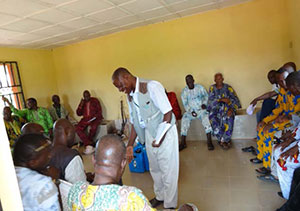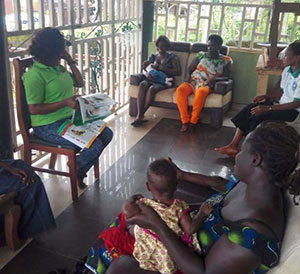
Today, in the remote Utagban community of Edo state in Nigeria, many women understand the critical benefits of breastfeeding, which can greatly increase infant survival and improve brain function and motor skills. In fact, in recent interviews with members of a local nutrition support group, the majority of women responded that they exclusively breastfed their babies for six months.
But the adoption of this practice is relatively new in Utagban, a community with no functioning health facilities and no reliable way for health workers to connect with families due to poor road conditions and hazardous terrain. Isolated in their rural community, mothers here were unable to find answers to their questions about breastfeeding and caring for their infants and young children. Consequently, they often fed their infants with infant formula, water, or other local foods including amoka (a mild laxative).
I am happy about what I am seeing and happy about what SPRING is doing in Utagban. We now have the information and key messages about what works in enhancing the health and development of our children. We shall ensure that all members of Utagban community get involved.
- Mrs. Rose Onobor IYCF support group chair, Utagban community
Recognizing the need for better feeding practices in Utagban, two USAID-funded projects are collaborating to provide nutrition training in the community. SPRING used UNICEF and World Health Organization recommendations to create a nationally-approved package of training materials on community-based infant and young child feeding (C-IYCF) practices in the HIV context.
The Sustainable Mechanisms for Improving Livelihoods and Household Empowerment (SMILE) project then worked with SPRING/Nigeria to roll out the training package, which builds health worker and community volunteer capacity to deliver quality counseling around key behaviors that promote and protect nutrition in the first 1,000 days.

As part of one training session, 105 community members gathered at the Utagban community hall for demonstrations and support group simulations conducted by SPRING staff. According to Pa Roland Aghimien, a community leader, this was the first time a large health care activity had taken place in the community.
SPRING/Nigeria also conducted meetings with local gatekeepers and government representatives to sensitize them to the importance of nutrition, and deployed community volunteers to help spread key messages and mobilize communities around nutrition. Effective communication about the benefits of exclusive breastfeeding was a key focus during these activities. Community health volunteers formed infant and young child feeding support groups and made home visits to their pregnant or nursing members.
According to Aghimien, the counseling has provided necessary support to mothers within the community. “I can now feel and understand how poor health conditions were imposed on mothers. I see these activities helping to reclaim the lost values of motherhood,” he said.
The experience of the Utagban community is proof that counseling and support activities such as home visits and group meetings can result in positive behavior change around child feeding practices. Utagban is a model for the successful implementation of the training package in Edo State and throughout Nigeria.